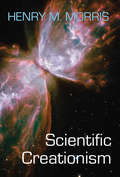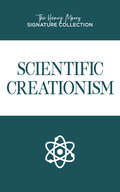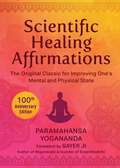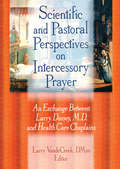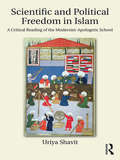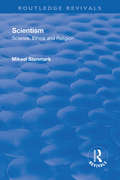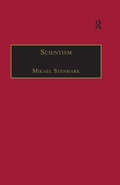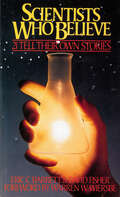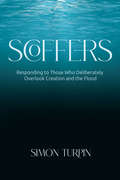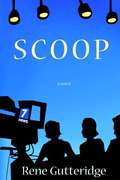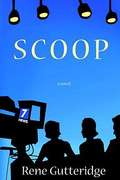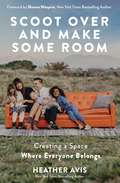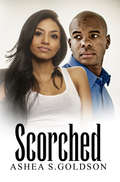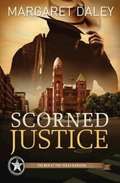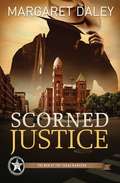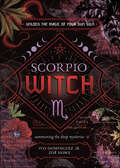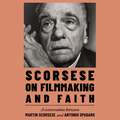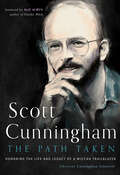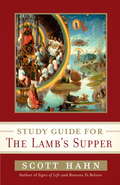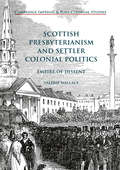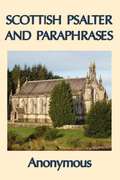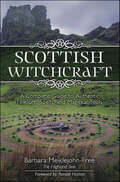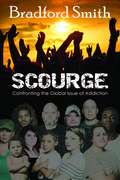- Table View
- List View
Scientific Creationism
by Dr Henry M. MorrisThe story of the origin of all things: Does the scientific evidence support special creation or atheistic evolution? Authoritative and thoroughly documented, Scientific Creationism is easily understood by readers with non-scientific backgrounds. Teachers, students, pastors, and other witnessing Christians can now be equipped with the convincing evidence for special creation. Updated and expanded, Scientific Creationism is a book that has changed the lives of people for Christ - people who have been blinded by the current origin-myth, evolution. "All ministers of the gospel, teachers and professors of our Christian schools on the primary and secondary level, should read this book. A copy should be placed in every church and school library, and used as a textbook in our Christian high schools and colleges."-Rev. C. Van Schouwen
Scientific Creationism (The Henry Morris Signature Collection)
by Henry MorrisEVOLUTIONISM VS. CREATIONISM…WHAT DOES THE EVIDENCE REVEAL? Explore scientific law as it connects to evolution & creation Extract the truth of these two conflicting worldviews Examine the evidence for the origin of earth and man Evolutionism is often taught blindly in schools without regard to what the evidence truly says. A powerful tool for teachers and other individuals, Scientific Creationism provides one of the most comprehensive analyses of the evidence for evolution and creation. What can we learn from fossils? How does catastrophism play a part in origins? Why are many “evolutionary” discoveries so surprising? A careful study of these questions shows that evolution is impossible, and creation is quite predictable! Includes a special section that places the scientific evidence in its proper biblical and theological context.
Scientific Healing Affirmations: The Original Classic for Improving One's Mental and Physical State (100th Anniversary Edition)
by Paramahansa Yogananda&“If the mind can produce ill health, it can also produce good health.&” These are the words of Parahamansa Yogananda—beloved Hindu yogi, guru, and monk, and author the international bestseller of The Autobiography of a Yogi. Yogananda was also one of the first voices to recognize the power of positivity with Scientific Healing Affirmations. First published in 1924, this groundbreaking book describes the pathway to achieve wellness and clarity through a series of time-honored affirmations derived from Eastern spiritual philosophy. Far ahead of its time, this book was the one of the first to highlight the scientific correlations between positivity and bolstering your mental, physical, and spiritual health. Organized into dynamic, easily digestible sections, this powerfully succinct book teaches how positive affirmations can help you: Prevent physical, mental, and physical diseaseReduce the impact of negative emotionsAvoid defeatist self-talkChoose your words carefullyBuild willpower and confidenceMeditate and hone your focusLive authenticallyAchieve and maintain inner peaceAwaken your life energyAnd create lasting positive change By working through this time-tested book, you can reduce suffering for you and others, unleash your inner potential, and begin on the path toward true and enduring happiness.
Scientific and Pastoral Perspectives on Intercessory Prayer: An Exchange Between Larry Dossey, MD, and Health Care Chaplains
by Larry Van De CreekMany people agree that prayer is a central feature of spiritual life. But what is prayer? Scientific and Pastoral Perspectives on Intercessory Prayer: An Exchange Between Larry Dossey, MD, and Health Care Chaplains explores common questions and concerns about intercessory prayer, or the act of praying for the benefit of others, from several different points of view. Chaplains, priests, ministers, and clergy in the health care profession will learn how prayer is examined from sources other than traditional Christian views, such as parapsychology. From Scientific and Pastoral Perspectives on Intercessory Prayer, you will learn what prayer means to some chaplains and to their ministry and how prayer can make drastic changes in the lives of your parishioners, patients, and their families.Written by eight chaplains, the articles in this text are in response to an essay by Larry Dossey, a nationally known physician who speaks and writes about prayer. The contributors to Scientific and Pastoral Perspectives on Intercessory Prayer discuss his points of view on intercessory prayer, which are based on quantum physics. You will learn if this area of physics can make a difference in how you practice your faith, how you worship, and what you think about or expect from prayer. Scientific and Pastoral Perspectives on Intercessory Prayer examines several other topics related to prayer, including: discovering whether or not intercessory prayer is truly different from other methods of meditation exploring the relationship between intercessory prayer and meditative or praise prayer linking prayers and their results to the expectations or intentions of those who engage in them differentiating between an intercession and a wish deciding for yourself what constitutes evidence or proof when discussing the aspects of prayer how our opinion of prayer relates to how we think about the universe and about God Since Scientific and Pastoral Perspectives on Intercessory Prayer focuses on the cooperation between science and theology, you will discover that, in many instances, people believe that the power of prayer should be taken seriously. This text also shows you how the questions and functions of prayer are shared by everyone, despite religious differences or methods of praying. Encompassing research and personal experiences, Scientific and Pastoral Perspectives on Intercessory Prayer will help you answer questions about religion and its role in the lives of parishioners, patients, and clergy, as well as provide you with evidence to the positive and healing power of prayer.
Scientific and Political Freedom in Islam: A Critical Reading of the Modernist-Apologetic School
by Uriya ShavitThe modernist-apologetic approach to the relation between revelation and science and politics has been a central part of Arab discourses on the future of Muslim societies for over a century. This approach introduced historical and theological narratives and interpretative mechanisms that contextualize reason and freedom in Islamic terms to argue that, unlike with Christianity, it is possible for Muslim societies to be technologically and politically advanced without forfeiting revelation as an all-encompassing, legally-binding guide. ‘Scientific and Political Freedom in Islam’ critically examines the coherence and consistency of modernist-apologetic scholars. This is done through a discussion of their general theorizing on reason and freedom, which is then followed by discussions of their commentaries on specific scientific and political issues in light of their general theorizing. Regarding the former, the focus is Darwin’s theory of evolution, while the universality of the "Biblical flood," the heliocentric model, the Big Bang model and Freudianism are also discussed. Regarding the latter, the focus is Islam’s desired structure of government and concept of participatory politics, while individual freedoms are also discussed. The book argues that the modernist-apologetic approach has great potential to be a force for liberalization, but also possesses inherent limitations that render its theory on the relation between revelation and freedom self-contradictory. Introducing a significant body of new information on the reasons for the failure of secularism and democracy and the attitudes towards Darwinism in the Arab world, this book is a valuable resource for students and scholars of Islamic Studies, comparative religion, democracy studies and evolution studies.
Scientism: Science, Ethics and Religion (Routledge Revivals Ser.)
by Mikael StenmarkThis title was first published in 20/11/2001: The intellectual and practical successes of science have led some scientists to think that there are no real limits to the competence of scienece, and no limits to what can be achieved in the name of science. This view (and similar views) have been called Scientism. In this book, scientists' views about science and its relationship to knowledge, ethics and religion are subjected to critical scrutiny. A number of natural scientists have advocated Scientism in one form or another - Francis Crick, Richard Dawkins, Carl Sagan, and Edward O. Wilson - and their impact inside and outside the sciences is considered. Clarifying what Scientism is, this book proceeds to evaluate its key claims, expounded in questions such as: is it the case that science can tell us everything there is to know about reality? Can science tell us how we morally ought to live and what the meaning of life is? Can science in fact be our new religion? Ought we become "science believers"? The author addresses these and similar issues, concluding that Scientism is not really science but disguised materialism or naturalism; its advocates fail to see this, not being sufficiently aware that their arguments presuppose the previous acceptance of certain extra-scientific or philosophical beliefs
Scientism: Science, Ethics and Religion (Routledge Science and Religion Series)
by Mikael StenmarkCan science tell us everything there is to know about reality? The intellectual and practical successes of science have led some scientists to think that there are no real limits to the competence of science, and no limits to what can be achieved in the name of science. Accordingly, science has no boundaries; it will eventually answer all our problems. This view (and similar views) have been called Scientism. In this important book scientists' views about science and its relationship to knowledge, ethics and religion are subjected to critical scrutiny. A number of distinguished natural scientists have advocated Scientism in one form or another - Francis Crick, Richard Dawkins, Carl Sagan, and Edward O. Wilson - and their impressive impact both inside and outside the sciences is considered. Clarifying what Scientism is, this book proceeds to evaluate its key claims, expounded in questions such as: Is it the case that science can tell us everything there is to know about reality? Can science tell us how we morally ought to live and what the meaning of life is? Can science in fact be our new religion? Ought we to become "science believers"? Stenmark addresses these and similar issues, concluding that Scientism is not really science but disguised materialism or naturalism; its advocates fail to see this, not being sufficiently aware that their arguments presuppose the previous acceptance of certain extra-scientific or philosophical beliefs.
Scientists Who Believe: 21 Tell Their Own Stories
by David Fisher Eric C. BarrettHere are the stories of scientists, both men and women, who have achieved career fulfillment in the sciences, yet found further fulfillment through faith in Jesus Christ.
Scientists Who Believe: 21 Tell Their Own Stories
by David Fisher Eric C. BarrettHere are the stories of scientists, both men and women, who have achieved career fulfillment in the sciences, yet found further fulfillment through faith in Jesus Christ.
Scion of Ikshvaku book 1
by Amish TripathiRam Rajya. The Perfect Land. But perfection has a price. He paid that price. 3400 BCE. INDIA Ayodhya is weakened by divisions. A terrible war has taken its toll. The damage runs deep. The demon King of Lanka, Raavan, does not impose his rule on the defeated. He, instead, imposes his trade. Money is sucked out of the empire. The Sapt Sindhu people descend into poverty, despondency and corruption. They cry for a leader to lead them out of the morass. Little do they appreciate that the leader is among them. One whom they know. A tortured and ostracised prince. A prince they tried to break. A prince called Ram. He loves his country, even when his countrymen torment him. He stands alone for the law. His band of brothers, his Sita, and he, against the darkness of chaos. Will Ram rise above the taint that others heap on him? Will his love for Sita sustain him through his struggle? Will he defeat the demon Lord Raavan who destroyed his childhood? Will he fulfil the destiny of the Vishnu? Begin an epic journey with Amish’s latest: the Ram Chandra Series.
Scoffers: Responding to Those Who Deliberately Overlook Creation and the Flood
by Simon TurpinThe pervasive influence of unbelievers is a force that demands an answer from the body of Christ. Scoffers: Responding to Those Who Deliberately Overlook Creation and the Flood offers a strong defense for biblical authority equipping believers to stand firm, preach the truth, and make disciples. “The reality of the biblical account of the Flood is that it is a horrifying account of judgment but also one of glorifying redemption.” The scoffers of Peter’s day were very much like modern-day skeptics in that they deliberately overlook the facts of biblical history. The cost of their unbelief is catastrophic even within the Christian church. Author Simon Turpin, the executive director of Answers in Genesis in the U.K., prepares us to confidently counter the philosophical bias of scoffers by: Revealing how the Gospel of salvation can only be understood in light of the Genesis account of a six-day creation and the global Flood. Providing an in-depth analysis of 2 Peter 3 to defend the biblical account of Creation against the false notions propagated by scoffers. Presenting a strong defense for the coming of Christ and Christianity for those who have rejected the truths found in Genesis 1 – 11. Scoffers gives today’s Christian families and leaders a strong defense for the authority of God’s Word helping the Church to “withstand in the evil day, and having done all, to stand” Ephesians 6:13.
Scoop (Occupational Hazards Series, Book #1)
by Rene GutteridgeAnd now back to our regularly scheduled insanity. Channel 7 news producer Hugo Talley dreams of working with first-class professionals. Instead he's saddled with a weatherman who can't admit when he's wrong, an aging anchorwoman who refuses to release her clawlike grip on the newsdesk, a conscience-stricken reporter who's reluctant to focus on sensationalism, and a new assistant--former homeschool student Hayden Hazard--who can't just seem to leave her faith outside the newsroom. When the Channel News 7 team inadvertently stumbles on a hot news story, Hugo is frantic to exploit this rare opportunity. But a series of crises--including a Botox disaster and the disappearance of a colleague--threatens to destroy his chance for ratings success and send him completely over the edge. Meanwhile Hayden's presence is distracting at least two coworkers. Softspoken reporter Ray Duffey isn't sure whether he's attracted or frightened by her outspoken faith, while ego-driven Sam Leege is certain her naïve spiritual convictions will fall victim to his persuasive attentions. With their oddball antics and all-too-real foibles, this lovable cast of characters offers a hilarious look at the sometimes--unexpected effects of taking one's faith boldly into the workplace.
Scoop: A Novel
by Rene GutteridgeAnd now back to our regularly scheduled insanity.Channel 7 news producer Hugo Talley dreams of working with first-class professionals. Instead he's saddled with a weatherman who can't admit when he's wrong, an aging anchorwoman who refuses to release her clawlike grip on the newsdesk, a conscience-stricken reporter who's reluctant to focus on sensationalism, and a new assistant-former homeschool student Hayden Hazard-who can't just seem to leave her faith outside the newsroom.When the Channel News 7 team inadvertently stumbles on a hot news story, Hugo is frantic to exploit this rare opportunity. But a series of crises-including a Botox disaster and the disappearance of a colleague-threatens to destroy his chance for ratings success and send him completely over the edge.Meanwhile Hayden's presence is distracting at least two coworkers. Softspoken reporter Ray Duffey isn't sure whether he's attracted or frightened by her outspoken faith, while ego-driven Sam Leege is certain her naïve spiritual convictions will fall victim to his persuasive attentions.With their oddball antics and all-too-real foibles, this lovable cast of characters offers a hilarious look at the sometimes-unexpected effects of taking one's faith boldly into the workplace.From the Trade Paperback edition.
Scoot Over and Make Some Room: Creating a Space Where Everyone Belongs
by Heather AvisHilarious and heartwarming stories that will empower you to make space for the other and discover the extraordinary, welcoming heart of God.Author and Instagram star Heather Avis has made it her mission to introduce the world to the unique gifts and real-life challenges of those who have been pushed to the edges of society. Mama to three adopted kids--two with Down Syndrome--Heather encourages us all to take a breath, whisper a prayer, laugh a little, and make room for the wildflowers.In a world of divisions and margins, those who act, look, and grow a little differently are all too often shoved aside. Scoot Over and Make Some Room is part inspiring narrative and part encouraging challenge for us all to listen and learn from those we're prone to ignore.Heather tells hilarious stories of her growing kids, spontaneous dance parties, forgotten pants, and navigating the challenges and joys of parenthood. She shares heartbreaking moments when her kids were denied a place at the table and when she had to fight for their voices to be heard. With beautiful wisdom and profound convictions, this manifesto will empower you to notice who's missing in the spaces you live in, to make room for your own kids and for those others who need you and your open heart.This is your invitation to a table where space is unlimited and every voice can be heard. Because when you open your life to the wild beauty of every unique individual, you'll discover your own colorful soul and the extraordinary, abundant heart of God.
Scorched
by Ashea S. GoldsonNothing has been easy for Nila since the fire that claimed her husband's life. Unable to complete her education in the U.S., Nila returns to India, where she resorts to dancing in a bar. Being a widow and single mother is hard enough, but being accused of her husband's murder has made life almost unbearable. When she runs into Malcolm, a handsome, womanizing, and ambitious acquaintance from her college days, a friendship emerges that sends Nila on a journey of self-discovery. Nila's mother-in-law is still determined to have her incarcerated for murder, and Malcolm and Nila soon find themselves drawn into a battle of good versus evil. Malcolm feels torn about jeopardizing his future and his fortune because of Nila's problems. His conflicted feelings make him the perfect target for the rich American runway model who attempts to steal his heart. Nila must re-evaluate her relationship with Malcolm, and her newly found faith is tested. When the heat is turned up, will Malcolm and Nila be able to overcome their conflicting cultures and ambitions to finally find real love, the kind that only comes from God?
Scorned Justice
by Margaret DaleyTexas Ranger Brody Calhoun is with his parents in west Texas when an unexpected attack injures the brother of Rebecca Morgan, Brody's high school sweetheart. The local sheriff, a good friend, asks for Brody's help. At first, it seems like an open-and-shut case. As Brody digs deeper, he realizes the attack may be related to an organized crime trial Rebecca will be overseeing. With Rebecca's help, he compiles evidence involving cattle rustling, bribery, and dirty payoffs that shatter the entire community and put Rebecca directly in the line of fire. Brody expects to protect her. What he never expects is to fall for Rebecca all over again, or for a murder to throw the case wide open. Is Brody's faith strong enough to withstand not only deep-rooted corruption and cattle rustling, but also love?
Scorned Justice
by Margaret DaleyTexas Ranger Brody Calhoun is with his parents in west Texas when an unexpected attack injures the brother of Rebecca Morgan, Brody's high school sweetheart. The local sheriff, a good friend, asks for Brody's help. At first, it seems like an open-and-shut case. As Brody digs deeper, he realizes the attack may be related to an organized crime trial Rebecca will be overseeing. With Rebecca's help, he compiles evidence involving cattle rustling, bribery, and dirty payoffs that shatter the entire community and put Rebecca directly in the line of fire. Brody expects to protect her. What he never expects is to fall for Rebecca all over again, or for a murder to throw the case wide open. Is Brody's faith strong enough to withstand not only deep-rooted corruption and cattle rustling, but also love?
Scorpio Witch: Unlock the Magic of Your Sun Sign (The Witch's Sun Sign Series)
by Zoë Howe Ivo DominguezBecome more passionate and confident in everything you do using the magical energy of your Sun sign. Sharing numerous spells, exercises, and stories, Ivo Dominguez, Jr. and Zoë Howe help you enhance your witchcraft and everyday activities. You'll explore Scorpio correspondences, divination techniques, self-care routines, and much more.This book deepens your relationship to yourself, providing many ways to channel your natural intensity into stronger witchcraft. Explore your Moon and rising sign traits, perform a ritual to meet the spirit of your sign, and overcome challenges that Scorpios often face. Featuring spells from Scorpio contributors, cleansing and shielding methods, and advice on magical timing, this book in the Witch's Sun Sign Series helps you achieve your goals and be your magnetic self.
Scorsese on Filmmaking and Faith
by Martin Scorsese Antonio Spadaro'Have I succeeded, in my own life? I don't know. I don't think so. I'm in my eighties now and I just don't know. But then, maybe "success" is the wrong way of framing it. You just try, and when you fail, you keep trying.'Over the course of eight years, Martin Scorsese and Jesuit theologian Antonio Spadaro discussed filmmaking and faith.From his Catholic upbringing amidst the brutality of 1950s New York to the heights of Hollywood, Scorsese sketches a unique self-portrait. And from Mean Streets to Killers of the Flower Moon - and especially the spiritual reckonings of The Last Temptation of Christ and Silence - he grants readers a new understanding of his films.Reflecting on grace and violence, fear and hope, passion and belief, these rich and intimate conversations offer a remarkable insight into the director's life and work.
Scott Cunningham—The Path Taken: Honoring the Life and Legacy of a Wiccan Trailblazer
by Christine AshworthGold Winner, Biographical Books, COVR Visionary Awards A moving portrait of the iconic figure who led the way in establishing Wicca in North America—with remembrances of his life by his sister, Christine Cunningham Ashworth, and appreciations written by key figures in today's world of witchcraft, magic, tarot, and astrology. The iconic and renowned bestselling author Scott Cunningham (1956–1993) played a significant role in establishing Wicca in North America. His pioneering book Wicca: A Guide for the Solitary Practitioner radically altered the practice of Wicca, enabling practitioners to self-initiate. Scott's books, especially his encyclopedias, remain popular today, years after his death. In recent years, Scott has also emerged as a celebrated queer icon, especially in the witchcraft world. Although so many people have come to Wicca and Paganism through his books, little is actually known about Scott Cunningham as a person. His little sister, Christine Cunningham Ashworth, seeks to remedy that. Christine grew up with him, laughed with him, learned with him, fought with him, and shared joys and sorrows. She writes about their childhood, gives a peek into their parents' lives, and brings to life what it was like to grow up in the Cunningham household. She explores the trajectory of Scott's magical path and affirms his legacy. Christine shares family photos and lifts the veil from Scott's life. Featuring a foreword by Mat Auryn, author of Psychic Witch and Mastering Magick, Scott Cunningham—The Path Taken contains contributions from leading figures in today's world of witchcraft, magic, tarot, and astrology, including Stephanie Rose Bird, Amy Blackthorn, Storm Faerywolf, Nancy Hendrickson, Dorothy Morrison, Nicholas Pearson, and Benebell Wen.
Scott Hahn's Study Guide for The Lamb's Supper
by Scott HahnA companion to Hahn's bestseller "The Lamb's Supper," this guide is ideal for individual or group use and serves as an important resource for those looking to deepen their faith and their understanding of the Catholic Mass.
Scottish Presbyterianism and Settler Colonial Politics
by Valerie WallaceThis book offers a new interpretation of political reform in the settler colonies of Britain's empire in the early nineteenth century. It examines the influence of Scottish Presbyterian dissenting churches and their political values. It re-evaluates five notorious Scottish reformers and unpacks the Presbyterian foundation to their political ideas: Thomas Pringle (1789-1834), a poet in Cape Town; Thomas McCulloch (1776-1843), an educator in Pictou; John Dunmore Lang (1799-1878), a church minister in Sydney; William Lyon Mackenzie (1795-1861), a rebel in Toronto; and Samuel McDonald Martin (1805?-1848), a journalist in Auckland. The book weaves the five migrants' stories together for the first time and demonstrates how the campaigns they led came to be intertwined. The book will appeal to historians of Scotland, Britain, Canada, Australia, New Zealand, South Africa, the British Empire and the Scottish diaspora.
Scottish Psalter and Paraphrases
by AnonymousThis contains the Scottish Psalter and Scripture Paraphrases, the primary hymnal of the Church of Scotland up through the 19th century. The Church of Scotland is a Presbyterian church, decisively shaped by the Scottish Reformation.
Scottish Witchcraft: A Complete Guide to Authentic Folklore, Spells, and Magickal Tools
by Barbara Meiklejohn-Free“Deeply personal and immersed in myth and folklore, [this] book draws from the old and the new in a manner that will resonate with the modern Witch today.” —Christopher Penczak, author of The Temple of Witchcraft and The Feast of the MorrighanHear the Call of the Highlands for Powerful Magick, Healing, and DivinationTake a journey through the magickal folk traditions of Scotland. Barbara Meiklejohn-Free, a Scottish hereditary witch, shares her own spiritual awakening into the craft and shows you how to integrate these practices into your own life. Discover the secrets of divination, scrying, faery magick, and communication with ancestors. Explore herb and plant lore and specific rituals to address what you most desire. Filled with inspiring anecdotes, craft history, and step-by-step instructions, this book will help you begin a new chapter of spiritual discovery.“Barbara masterfully and authentically weaves together the traditions of Scottish Witch-lore, along with her personal story of growing up in the Highlands as a genuine Scottish Witch.” —Flavia Kate Peters, author of Witches Wisdom and the Dark Goddess Oracle Deck“A joyous, yet deeply personal, discovery of the strength and power of Scottish Witchcraft.” —Kate West, author of The Real Witches' Craft
Scourge: Confronting the Global Issue of Addiction
by Bradford SmithChemical addiction wreaks havoc across a broadening swath of society leading those who suffer toward certain destruction. Never before has humanity been so afflicted. Scourge takes a heart-wrenching, unexpected first-hand look at the spiritual aspect of this deadly assault upon the very souls of mankind. Of those who struggle, some find devastation and death while others find redemption and life.
